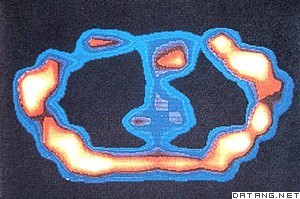1) diffusion-weighted MR imaging


磁共振扩散加权成像
1.
Applications in evaluation of diffusion-weighted MR imaging in liver focal masses;


磁共振扩散加权成像在肝脏占位性病变中的应用
2.
Objective To evaluate the application of diffusion-weighted MR imaging(DWI) in hepatic masses.
目的 探讨磁共振扩散加权成像(DWI)在肝脏占位性病变中的诊断价值。
2) diffusion-weighted magnetic resonance imaging


扩散加权磁共振成像
1.
Magnetic resonance sialography(MRS) and diffusion-weighted magnetic resonance imaging(DW MRI) ,as two of the most important progresses in the latest MRI techniques,with the virtue of non-invasion and non-ionizing radiation,has been rapidly developed in salivary function assessment in recent years,and it has kept on improving technically.
磁共振涎管成像(magnetic resonance sialography,MRS)和扩散加权磁共振成像(diffusion-weighted magnetic resonance imaging,DW MRI)是近年新发展起来的涎腺功能评价方法,具有无创、无辐射的特点。
3) magnetic resonance diffusion weighted imaging


磁共振弥散加权成像
1.
A control study of magnetic resonance diffusion weighted imaging of patients with acute cerebral infarction and early(<48 hours) intervention with resuscitating and scalp acupuncture therapies(醒脑开窍针刺加头针法);
醒脑开窍针刺加头针早期介入治疗脑梗死的磁共振弥散加权成像对照研究
2.
Objectives To study the chronological and spatial rules of changes during focal cerebral ischemia and reperfusion in different brain regions with magnetic resonance diffusion weighted imaging (DWI) in a rat model of occlusion of middle cerebral artery(MCAO),and to explore the development of cytotoxic edema in acute phase.
目的 利用大鼠大脑中动脉阻塞 (MCAO)及再灌注模型 ,在磁共振弥散加权成像 (magneticresonancediffusion weightedimaging ,DWI)观察中 ,研究各脑区不同时相的缺血改变时空变化规律 ,探讨急性期细胞毒性水肿的演变。
4) Diffusion weighted imaging


磁共振弥散加权成像
1.
Diffusion weighted imaging is a unique and most ideal imaging method to observe water molecular diffusion in vivo tissue by using magnetic resonance imaging.
磁共振弥散加权成像(DWI)是利用MRI观察活体组织水分子弥散运动最理想且唯一的成像方法。
5) MR-DWI


磁共振弥散加权成像
1.
Objective It s to investigate the relationship between the MR diffusion weighted imaging (MR-DWI) scanning appearance and Traditional Chinese Medicine (TCM) differentiation syndromes of the patients of acute ischemic apoplexy (AIA),through analyzing materials of brain MR-DWI scanning and ADC value in different TCM syndromes of AIA patients.
目的 通过回顾性分析急性缺血性中风(acute ischemic apoplexy,AIA)病例的头颅磁共振弥散加权成像(diffusion weighted imaging,DWI)影像表现与中医临床证型资料,探讨急性缺血性中风MR-DWI影像表现与中医辨证分型的关系,目的为急性缺血性中风的中医临床辨证提供客观参考指标,使其中医辨证客观化、微观化。
6) magnetic resonance diffusion imaging


磁共振扩散成像
1.
The strength and the direction of diffusion sensitive magnetic gradient field are important experimental parameters in magnetic resonance diffusion imaging,but these parameters cannot be modified by user of the software.
扩散敏感梯度磁度的方向及强度是磁共振扩散成像实验的重要参数,但这二个参数不能由用户通过设备自带的软件设定。
补充资料:磁共振成像
| 磁共振成像 magnetic resonance imaging 利用人体组织中某种原子核的核磁共振现象,将所得射频信号经过电子计算机处理,重建出人体某一层面的图像的诊断技术。又称核磁共振成像术。英文简称MRI。
MRI在临床上主要用于以下部位:①头部。可清晰分辨脑灰质和白质,对多发性硬化等一类脱髓鞘病优于CT。对脑外伤、脑出血、脑梗塞、脑肿瘤等同CT类似,但可显示CT为等密度的硬膜下血肿。脑梗塞或脑肿瘤的早期,CT不能查出,而MRI有可能显示。对钙化和脑膜瘤显示不好。脑干及小脑病变的MRI图像由于没有伪影是首选检查方法。②脊柱。不需要造影剂就能清晰区分脊髓、硬膜囊和硬膜外脂肪。对肿瘤、脊髓空洞症、脱髓鞘病变等均有较高诊断价值。显示骨折或脱位不如常规X射线或CT,但能观察脊髓损伤情况。显示椎间盘较好,可以分辨纤维环和髓核,特别是矢状面图像可以同时显示多个椎间盘突出。③四肢。对骨质本身病变显示不如常规X射线或CT。对软组织及肌肉病变包括肿瘤及炎症都能清晰显示,特别是对早期急性骨髓炎,是一种灵敏度很高的检查方法。也是检查膝关节半月板病变的首选方法。④盆腔。对直肠及泌尿生殖系统优于CT,无辐射损害,特别适用于孕妇及胎儿检查。⑤胸部。对肺的检查不如常规X射线,对纵隔检查则优于CT,不用造影剂即可分辨纵隔血管和肿物,也是一项有价值的心血管检查技术。⑥腹部。主要用于肝、胰、脾、肾等实质脏器。 |
说明:补充资料仅用于学习参考,请勿用于其它任何用途。
参考词条
